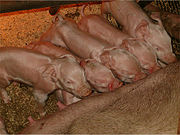
Savaging
Encyclopedia

Animal science
Animal Science is described as "studying the biology of animals that are under the control of mankind". Historically, the animals studied were farm animals, including livestock and horses, but courses available now look at a far broader area to include companion animals, for example dogs, cats and...
, savaging (from savage) is overt aggression, usually including cannibalistic
Cannibalism (zoology)
In zoology, cannibalism is the act of one individual of a species consuming all or part of another individual of the same species as food. Cannibalism is a common ecological interaction in the animal kingdom and has been recorded for more than 1500 species...
infanticide
Infanticide (zoology)
In animals, infanticide involves the killing of young offspring by a mature animal of its own species, and is studied in zoology, specifically in the field of ethology. Ovicide is the analogous destruction of eggs. Although human infanticide has been widely studied, the practice has been observed...
of newborn offspring
Offspring
In biology, offspring is the product of reproduction, of a new organism produced by one or more parents.Collective offspring may be known as a brood or progeny in a more general way...
, by a mother
Mother
A mother, mum, mom, momma, or mama is a woman who has raised a child, given birth to a child, and/or supplied the ovum that grew into a child. Because of the complexity and differences of a mother's social, cultural, and religious definitions and roles, it is challenging to specify a universally...
animal. It is particularly prevalent among pig
Pig
A pig is any of the animals in the genus Sus, within the Suidae family of even-toed ungulates. Pigs include the domestic pig, its ancestor the wild boar, and several other wild relatives...
s, where it affects up to 5% of gilts.
Some gilt attacks on the newborn piglets are non-fatal, while others involve the death
Death
Death is the permanent termination of the biological functions that sustain a living organism. Phenomena which commonly bring about death include old age, predation, malnutrition, disease, and accidents or trauma resulting in terminal injury....
and eventual consumption
Eating
Eating is the ingestion of food to provide for all organisms their nutritional needs, particularly for energy and growth. Animals and other heterotrophs must eat in order to survive: carnivores eat other animals, herbivores eat plants, omnivores consume a mixture of both plant and animal matter,...
of the piglets by the mother. It is estimated that 50% of piglet fatality is due to the mother sow attacking or unintentionally crushing the newborn pre-weaned animals.
Pigs will sometimes attack other animals, including humans.
Savaging has a negative effect on pig farming
Intensive pig farming
Intensive piggeries are a type of factory farm ' specialized in the raising of domestic pigs up to slaughter weight...
. Efforts to eliminate it include additional care and attention to the mother pig. Aggressive behavior may be due to fear, discomfort, and unsanitary conditions. Control of the birthing process and human supervision are the best ways to prevent the mother from eating the young, but cost-effectiveness must also be considered.
Statistics indicate that cannibal mother pigs are usually repeat offenders. Thus, one method of prevention is to avoid use of past-offenders for breeding. Alternatively, placing experienced sow
Sow
Sow may refer to:* Sowing seed* Female animals: badger, bear, pig family* Shape in which metal is cast* Type of siege engine* River Sow, England* "Sow", a poem by Sylvia Plath* Sow , the band/spoken word project comprising Anna Wildsmith-People:...
s next to first-time mother gilts may discourage aggressive behavior.
Proper diet and nutrition
Nutrition
Nutrition is the provision, to cells and organisms, of the materials necessary to support life. Many common health problems can be prevented or alleviated with a healthy diet....
decreases the likelihood of gilt cannibalism. Medication or hormones, such as mysoline, can also be given.
External links
- Prairie Swine 2001 article about savaging.
- Description and details at ThePigSite.com

